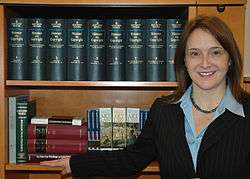Register of Copyrights

The Register of Copyrights is the director of the United States Copyright Office within the Library of Congress, as provided by 17 U.S.C. § 701. The Office has been headed by a Register since 1897. The Register is appointed by, and responsible to, the Librarian of Congress.
Although the title suggests a clerical role, Registers of Copyrights have been responsible for creating the procedures and practices of the Copyright Office and establishing standards for registration of copyright. They have increasingly been responsible for setting or influencing United States copyright policy. Today the Register is responsible for administering rulemaking procedures and producing authoritative interpretations of some aspects of U.S. copyright law, as well as advising the Librarian of Congress on the triennial proceeding on exceptions to the anticircumvention rules of the Digital Millennium Copyright Act. The Register also routinely testifies before Congress on copyright policy matters.
Maria A. Pallante was the twelfth appointed register and the fifteenth person to serve in the position. She initially took the position in an acting capacity following the December 31, 2010 retirement of the previous Register, Marybeth Peters.[1][2] On June 1, 2011, Pallante was officially appointed to the position.[3]
On October 21, 2016, Pallante was appointed senior advisor for digital strategy, an apparent change in duties. Rather than accept the position, Pallante submitted her resignation on October 24, 2016.[4] Karyn Temple Claggett has been appointed acting register of copyrights during the search for a new permanent office holder.[5]
On April 26, 2017, the House of Representatives voted in favor of a bill that, if approved by the Senate, will make Register of Copyrights a position that is filled by presidential appointment with Senate confirmation, rather than appointed by the Librarian of Congress—a policy that has been in place since the establishment of the Copyright Office, and impose a maximum term of 10 years. The bill has been supported by the entertainment industry and other groups (including the MPAA and RIAA), as the new selection procedure would give them the opportunity to lobby for a Register of Copyrights that aligns with their interests in stronger copyright protection. These effects have been the basis of opposition towards the bill by politicians, and groups such as the Electronic Frontier Foundation and Public Knowledge, which feel that the bill would give corporate stakeholders a higher level of influence over U.S. copyright policies, rather than balancing the laws to meet the needs of the public.[6][7][8]
List of Registers of Copyrights
- Karyn Temple (acting), 2016–present
- Maria Pallante, 2011–2016
 Marybeth Peters, Register of Copyrights, 1994–2010
Marybeth Peters, Register of Copyrights, 1994–2010 - Marybeth Peters, 1994–2010
- Barbara Ringer (acting), 1993–94
- Ralph Oman, 1985–1993
- Donald Curran (acting), 1985
- David Ladd, 1980–1985
- Barbara Ringer, 1973–1980
- Abe A. Goldman (acting), 1973
- George D. Cary, 1971–1973
- Abraham L. Kaminstein, 1960–1971
- Arthur Fisher, 1951–1960
- Sam Bass Warner, 1945–1951
- Richard Crosby De Wolf (acting), 1944–1945
- Clement Lincoln Bouvé, 1936–1943
- William Lincoln Brown, 1934–1936
- Thorvald Solberg, 1897–1930
References
- ↑ "Maria Pallante Appointed Acting Register of Copyrights". News from the Library of Congress. Library of Congress. 2010-12-17. Retrieved 2010-12-20.
- ↑ "Register of Copyrights Announces Intention to Retire". U.S. Copyright Office NewsNet. United States Copyright Office. 2010-09-13. Retrieved 2010-09-13.
- ↑ "Maria Pallante Appointed 12th Register of Copyrights". News from the Library of Congress. Library of Congress. 2011-06-01. Retrieved 2011-06-01.
- ↑ Robert Levine, "Maria Pallante's Departure From the Copyright Office: What It Means and Why It Matters," Hollywood Reporter (Oct. 25, 2016).
- ↑ "Librarian of Congress Makes Senior-Level Appointments".
- ↑ "Big content cheers as Congress votes on changes to US Copyright Office". Ars Technica. Retrieved 27 April 2017.
- ↑ "House Passes Copyright Office Reform Bill". Broadcasting & Cable. Retrieved 27 April 2017.
- ↑ "Congress is trying to give even more power to Hollywood". The Verge. Retrieved 27 April 2017.
Sources
- "Congressional Testimony by Register of Copyrights". United States Copyright Office. Retrieved 2008-08-30.
- "Historical Information". United States Copyright Office. Retrieved 2008-08-30.
- United States Code. 17 U.S.C. § 701.